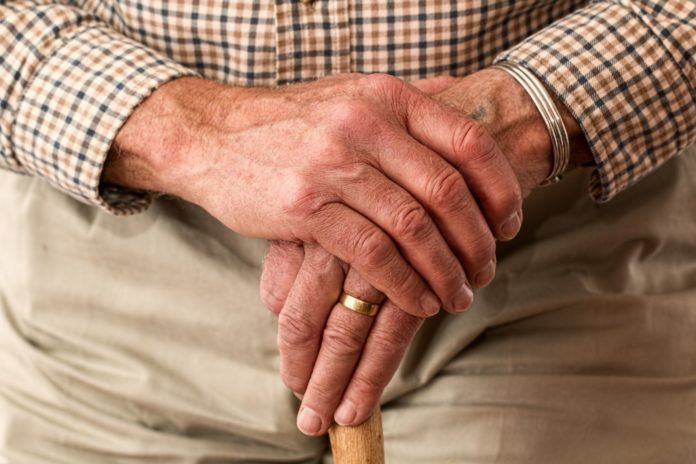“Getting old sucks!” That’s what my 86-year-old father shared with me on a recent visit. He has lived in Boca Raton, Florida, since moving from my childhood home in Connecticut a few years ago. He lives alone; his wife of 49 years, my mother, died of ovarian cancer ten years ago at the age of 73 (she died a month after my wedding and she never met her grandchildren, but that’s another story). They had this amazingly self-contained marriage and I didn’t expect my father to live much longer after my mother’s death. But he’s a pretty tough guy, having grown up poor in Brooklyn and built a remarkable life for himself and our family.
My dad lives a really solitary life. I live on the other side of the country and my sister lives in London, so we don’t see him that often (though we both Skype regularly). He has no friends and, aside from his daily walks around the neighborhood and trips to the supermarket, rarely leaves his house. His only regular contact is with his home health aide, a wonderful young woman who comes five days a week and makes sure that he eats well, takes his medication, does his physical therapy, and provides a small amount of companionship. Both my sister and I have asked my dad to move in with us, but he refuses. His world has steadily shrunk until it is now only a few miles in diameter (he no longer wants to fly).
My dad was always a fit and athletic fellow (he skied until he was 81) and he is, to this day, in generally good physical health for a guy his age. But he was diagnosed with dementia earlier this year and his cognitive decline was steep; he had a hard time remembering things and stuttered and stammered frequently when talking. But a new set of meds resulted in a remarkable turnaround such that we recently had a lengthy conversation about, not a surprise here, the health care system and the Affordable Care Act. His knowledge was deep, his thoughts focused, and his contributions to the conversation clear and cogent. But the new meds only slow my father’s inevitable march to oblivion. Seeing his once-toned body deteriorate is bad enough, but seeing his once-sharp mind go is really painful (and more so for him) because he seems to be losing himself.
One of the most interesting things he has shared with me is an epiphany that he is an old man (said with absolute incredulity). At first blush, this seems like an odd statement give that he is 86 years old, by most accounts a very old man. Yet, he doesn’t see himself as old even when it is obvious that he is. Upon reflection, this incongruence of perception and reality actually makes some sense. My father has only been truly old, as defined by his health and functioning, for perhaps five years, yet he was young and vigorous for decades before that. It takes time for perception to catch up with reality, but I’m not sure it ever does.
My father told me recently that his only purpose in life now is to support the “medical-industrial complex.” And support it he does with several weekly trips to a team of physicians and physical therapists, the medical supply store, and the pharmacy. Yes, he has his small pleasures, such as Skyping with his granddaughters on Saturday mornings, reading, and watching C-SPAN. But meaning and real purpose? He says he has neither.
I actually think my mother’s death was more dignified and humane. Yes, she suffered for more than a year through surgery and chemotherapy before her death. But she was herself until the very end and we were all able to say goodbye and make peace with her death. But for my father, like so many others, old age means a slow loss of who he is. And it’s only going to get worse, particularly if his body stays alive even as his mind, for all intents and purposes, dies.
I asked my father recently whether he’d ever thought about “checking out” (I couldn’t bring myself to use the S-word). He said he had, but he wasn’t there yet. Interestingly, some years ago, he told me that when he felt his life was no longer meaningful, he would, in fact, check out. I suppose it’s an easy thing to say when death is far off. He now says that things haven’t gotten that bad yet. My immediate thought was that by the time it gets bad, it’s too late to do anything about it. In any case, there just aren’t any easy ways to end your life these days, unless you have a car and a garage which, I hear, is the easiest and most comfortable way to end your life. A short story by Kurt Vonnegut, Ethical Suicide Parlor from Welcome to the Monkey House, comes to mind in which there exist government-run suicide parlors where people can choose to end their lives. This doesn’t seem entirely unreasonable to me (though this is another story as well).
My musings about old age also caused me to recall a wonderful riff from the late George Carlin about how aging in reverse would be a much better way to go. You start out old, life gets better as you get younger, before death you are in the comfort of your mother’s womb, and then you die at the moment of your father’s orgasm. Now that is a happy ending!
But there are no happy endings for my father. Just a life that doesn’t seem like a life anymore and a slow, heart wrenching, and inescapable march toward death. I agree, Dad, “Getting old sucks.”


 Dr. Jim Taylor received his Bachelor's degree from Middlebury College and earned his Master's degree and Ph.D. in Psychology from the University of Colorado. He is a former associate professor in the School of Psychology at Nova University in Ft. Lauderdale and in the Graduate School of Professional Psychology at the University of Denver. He is currently an adjunct professor at the University of San Francisco. Dr. Taylor is the author of 14 books and the lead editor of three textbooks, has published more than 750 articles in scholarly and popular publications, and has given more than 1000 workshops and presentations throughout North America, Europe, and the Middle East. Dr. Taylor blogs for psychologytoday.com, huffingtonpost.com, as well as on his own
Dr. Jim Taylor received his Bachelor's degree from Middlebury College and earned his Master's degree and Ph.D. in Psychology from the University of Colorado. He is a former associate professor in the School of Psychology at Nova University in Ft. Lauderdale and in the Graduate School of Professional Psychology at the University of Denver. He is currently an adjunct professor at the University of San Francisco. Dr. Taylor is the author of 14 books and the lead editor of three textbooks, has published more than 750 articles in scholarly and popular publications, and has given more than 1000 workshops and presentations throughout North America, Europe, and the Middle East. Dr. Taylor blogs for psychologytoday.com, huffingtonpost.com, as well as on his own 
















